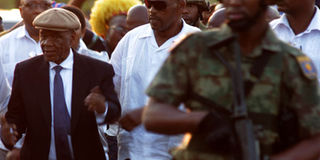SADC calls for poll as Lesotho crisis worsens

Lesotho’s Prime Minister Tom Thabane (left) arrives at the Maseru border under heavy security on September 16. Amid a political crisis that has engulfed the tiny kingdom of Lesotho following last month’s attempted coup, a member of the royalty is calling for a more muscular monarch. PHOTO | HLOMPHO LETSIELO |
What you need to know:
- Putsch saw prime minister fleeing unceremoniously to South Africa
- Amid the confusion caused by the attempted coup, SADC declined to deploy troops in the country, as requested by the embattled and apparently lame duck prime minister.
After listing dangerously over the past few months, the Lesotho ship of state is still imperilled by the tumultuous and mounting political waves surrounding it.
Alarmed, the 15-member South African Development Community (SADC) has mooted the holding of new elections “as soon as possible”, and well before 2017, when the next elections are officially due.
According to South Africa’s International Relations and Cooperation Minister Maite Nkoana-Mashabane, Lesotho’s current coalition government is not “fully functional” and its leaders are planning to “shorten the mandate of the coalition”.
The tiny southern African country’s enduring political paralysis was aggravated by an attempted coup on August 30 staged by renegade general Tlali Kamoli.
The military action stalled peace talks between the three deadlocked political parties that form the ruling coalition headed by current Prime Minister Tom Thabane.
The putsch also saw Thabane unceremoniously fleeing to South Africa together with his family. He returned later under South African police protection, but the country’s parliament remains closed, as it has been since June.
The legislature was expected to re-open on Friday, but instead there were exchanges of fire between soldiers and police officers, who had been disarmed during the attempted coup.
DECLINED TO DEPLOY TROOPS
Amid the confusion caused by the attempted coup, SADC declined to deploy troops in the country, as requested by the embattled and apparently lame duck prime minister.
According to the regional body, military action in the unstable country was not a viable measure to resolve the country’s problems, which SADC said could only be resolved by the electorate so that “political challenges don’t get mixed up with the security (ones)”.
Unlike currently, there was SADC military intervention after general elections in 1998 were won by the Lesotho Congress of Democrats party, whose candidate, Pakalitha Mosisili, became the prime minister. The opposition, however, staged protests against the results and riots broke out, forcing SADC to intervene to help restore order.
Officially listed as a constitutional democracy, the country formerly known as Basutoland has a history of political instability. It gained independence from Britain and became the Kingdom of Lesotho in 1966, with Moshoeshoe II as king and Chief Leabua Jonathan of the Basotho National Party as prime minister.
The post-independence era was tumultuous and marked by seemingly intractable challenges.
In 1986, for instance, Major-General Justin Lekhanya replaced Chief Jonathan in a coup allegedly instigated by apartheid South Africa, which had blocked the country’s borders, demanding expulsion of anti-apartheid activists.
A few years later in 1990, King Moshoeshoe II went into exile and his son and current sovereign Letsie III was sworn in to replace him. The new king served until 1995, when King Moshoeshoe II was restored to the throne, only to soon afterwards die in a car crash, whereupon his son once again took up the throne.
Earlier, in 1991, there had been more uncertainty in the country after Major-General Lekhanya was forced out by Colonel Elias Tutsoane Ramaema in yet another military coup. The new leader lifted an earlier ban on political activity, and in 1993 the Basutoland Congress Party came to power through fresh elections. The country experienced new instability in 1994, when fighting broke out among rival army factions.
Apart from the perennial political schisms and a history of pervasive political violence, including military coups and assassinations, Lesotho’s problems have been aggravated by the fact that the country is landlocked.
Surrounded by South African territory on all sides, it is virtually dependent on the more prosperous country for economic survival.
Further, the tiny kingdom has the unenviable reputation of having one of the world’s highest HIV-Aids rates. It has also been afflicted by crippling droughts in the past, and had to depend on emergency food aid to feed its population.




